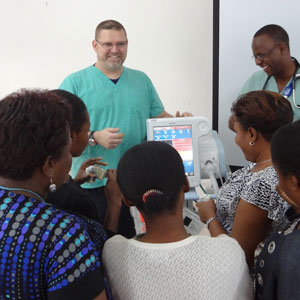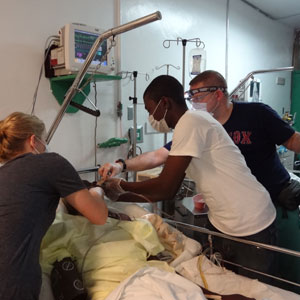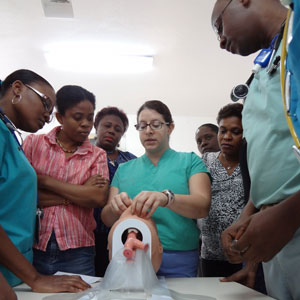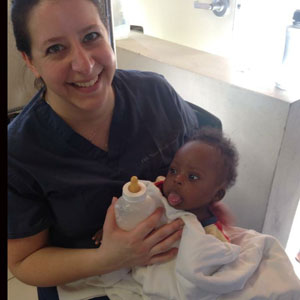The 7.0 magnitude earthquake that hit Haiti back in 2010 left a wide swath of destruction across much of the country. The nation’s already fragile medical infrastructure was among the casualties, leaving many citizens without access to medical care.

Over the coming months, volunteers from here in the U.S. and around the world flocked to the country to help, and AARC member Daniel D. Rowley, MSc, RRT-ACCS, RRT-NPS, RPFT, FAARC, clinical coordinator for pulmonary diagnostics and respiratory therapy services at the University of Virginia Medical Center in Charlottesville, was one of them.
A desire to do more
“A faculty member at the University of Virginia School of Nursing had planned a return trip to Port Au Prince five months after the 2010 earthquake in Haiti,” he explains. “A respiratory therapist was requested to join a small team of nurses. I volunteered to join the team for a ten day stint in a post-disaster, urban setting, recognizing that my training and years of emergency and critical care practice experience could be a valuable asset to the team.”
Rowley says he underestimated just how valuable his services would be in caring for adult and pediatric patients, and the experience left him with a desire to do more. That desire was fulfilled in 2011 when former AARC Executive Director Sam Giordano, MBA, RRT, FAARC, made a special announcement at the summer House of Delegates meeting on behalf of then CRUDEM Foundation President Peter Kelly, MD.
 Rowley, right, assists with the care of a patient.
Rowley, right, assists with the care of a patient.Dr. Kelly was looking for RTs who would be willing to take part in relief missions to Milot, Haiti. “It was felt that respiratory therapists could help by developing respiratory care didactic presentations and clinical support training for physician and nursing staff at Hopital Sacre Coeur (HSC),” says Rowley.
Off and running
With support from AARC member Natalie Napolitano, MPH, RRT-NPS, FAARC, a clinical specialist at the Children’s Hospital of Philadelphia, and industry representative and AARC member Ed Coombs, MA, RRT-ACCS, RRT-NPS, FAARC, from Draeger, a team was formed and the group was off and running.
“We performed a formal needs assessment on our first visit to HSC and subsequently developed a ten-month progressive curriculum to deliver advanced education in respiratory and critical care medicine, with the goal of helping them acquire knowledge and skills sufficient enough to safely utilize donated invasive and noninvasive equipment in the absence of U.S. health care provider teams,” says Napolitano. “At this point in our partnership, we are providing ongoing clinical instruction to our Haitian colleagues to help them enhance targeted clinical programs, such as respiratory care and management for CHF in adults and RDS in newborns.”

Rowley and Napolitano have made nine trips to the country to date, but overall the team, which includes 13 other RTs who have volunteered to offer their expertise, has racked up 16 visits over the past few years. Two more will take place in October and December of this year, as two different medical teams travel to the country to continue the work.
A pediatric focus group has also been formed, consisting of Napolitano, an RN, and three physicians here in the U.S. who conduct bi-monthly Skype calls with three pediatricians on the HSC staff. “With successive trips, we have seen greater cooperation in working with the Haitian staff and small indicators of improved respiratory care practice,” says Napolitano.
Why they do it
Why have these therapists decided to devote so much of their time and energy to working outside US borders? Rowley says it all comes down to the need they saw in the country. “We made a commitment to the foundation and hospital to perform the training program after our first visit, when we performed the formal needs assessment. During each of our visits, we became progressively invested in the respiratory care training program, hospital, staff, and community in Milot.”
Says Napolitano, “When we return to Milot, it is like visiting good friends with opportunities to gain many more. We feel that our specialized knowledge and training have contributed to improvements in care delivery within a community that welcomes us, both professionally and personally.”
What they’ve gotten in return

How have these efforts helped them build their own careers? Both therapists emphasize it’s not really about their individual careers, but about raising awareness of their profession and ensuring people in countries like Haiti have access to more of the same kinds of services available in the developed world.
“The more tangible measures of career growth resulting from international volunteerism as a respiratory therapist occur with sustained commitment to a shared purpose and clear goals,” says Napolitano. “Arguably, the most significant career benefit is promoting the profession of respiratory therapy by building an awareness of our specialty and the benefits we can bring to educating the patient care management team.”
Rowley echoes those sentiments. “Countries with the capacity to do so may develop the profession in their nation. If not, at a minimum we should strive to provide essential respiratory care education to the physicians and nurses so that they may one day deliver improved respiratory care to their patients.”





